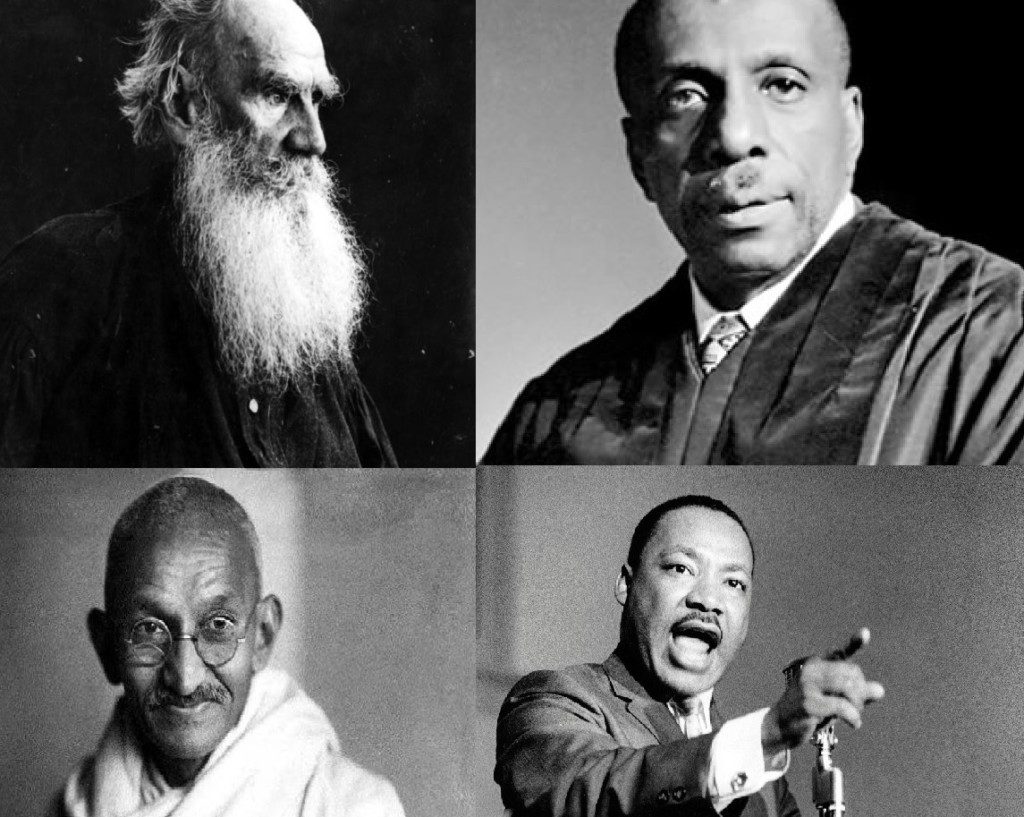
Four social justice advocates whose philosophy may be applicable to today’s education freedom movement
“That this social order with its pauperism, famines, prisons, gallows, armies, and wars is necessary to society; that still greater disaster would ensue if this organization were destroyed; all this is said only by those who profit by this organization, while those who suffer from it – and they are ten times as numerous – think and say quite the contrary.” – Leo Tolstoy, The Kingdom of God is Within You
The early years of the 20th century saw two incredibly significant events in the struggle for African Americans to achieve equal rights. Eventually, the positive development overcame the negative, but only with great sacrifice on two continents and decades of determined effort and inspired leadership. As we celebrate Black History Month, some time to reflect upon this magnificent record is in order.
Let’s get the negative event out of the way first. In 1910, a group of Progressive Republicans teamed with Democrats to strip Speaker of the House Joseph Cannon of the power to appoint committee chairmen. Chairmen came to be appointed by seniority, which not only decentralized power in the House, but enormously empowered Democrats from the old Confederacy. The Republican Party – the party of Lincoln – wasn’t competitive in the South once southern racists saw to it that former slaves couldn’t vote through Jim Crow laws. Intended or not, this “Cannon Revolt” enormously enhanced the power of segregationists for decades.
The Old Bulls, as the committee chairmen came to be known, ruled their fiefdoms with an iron fist. They decided which bills would get hearings and which would die. They said “Jump,” and the rest of the committee said, “How high?” Disproportionately, the Old Bulls were defenders of segregation.
Any change in American tax policy, for instance, had to begin in the House Ways and Means Committee. If you wanted to change something about taxes, and many people did, Rep. Kyle K. Klan, serving in his fifth term as chairman, decided which tax bills received hearings and which did not. If you already guessed that the Right Hon. Kevin K. Klux was biding his time waiting to replace Kyle when he finally went to pick cotton in Hell’s sharecropping plantation, give yourself a gold star, because that is essentially how things worked.
The Old Bulls ran the House for a mere 60 years and change, but in the end, a letter sent from a Russian to an Indian in 1908 ended their reign of error. This, in fact, is where the story gets really interesting.
Lev Nikolayevich Tolstoy was born into an aristocratic Russian family in 1828. An enormously successful author, Tolstoy experienced a moral crisis and a spiritual awakening in the 1870s. Tolstoy’s reading of the Sermon on the Mount left him with a unique Christian pacifist/anarchist perspective, reflected most notably in The Kingdom of God is Within You. In this book, Tolstoy made the case that the Sermon on the Mount commanded an end to all violence, even defensive violence. Tolstoy, noting the nonviolent teachings of the New Testament and the nonviolent resistance of the early Christian Church, called for non-violent resistance to oppression.
In 1908, Tolstoy wrote a letter to a young Indian lawyer living in South Africa laying out a path of non-violent resistance. In 1914, this lawyer, Mahatma Gandhi, returned to India and commenced a decades-long non-violent resistance for Indian independence from British rule.
During the struggle for Indian independence in 1936, the Christian Student Society of India sponsored a delegation of Black American ministers to tour South Asia. Howard Thurman gave dozens of lectures in India as part of this tour and met with Gandhi. During this meeting, Gandhi asked the Black ministers why they had adopted the religion of their oppressors. This was a statement filled with unintentional irony. As a lifelong Anglican, I’ve observed that Gandhi, although a Hindu, was closer to practicing the religion of his oppressors than his European colonial overlords.
Thurman then served as a key mentor to Martin Luther King Jr. and other leaders of the American Civil Rights Movement. As with Tolstoy and Gandhi, Thurman served as the vital theoretician in aid of the implementer of the strategy of non-violent resistance. Thurman assisted King in developing the non-violent resistance movement, which ultimately led to the successful passage of the Civil Rights Act in 1964. For all their power, fear and hatred, the Old Bulls stood defeated by a still greater power.
Sometimes it is said that the parental rights movement is the Civil Rights struggle of the 21st century. It is true that our case for equality of opportunity is rooted in justice and fairness. It is equally true that the status quo provides the least to the children starting with the least, and the most to the children starting with the most. I also believe that any attempt to address poverty without addressing a system that spends like Luxembourg but produces results for African American and Hispanic children closer to Mexico is doomed to bitter disappointment.
Black History Month is an appropriate time for the education freedom movement to consider how Tolstoy, Gandhi, Thurman and King would advise us today. What can we learn and apply from these and other leaders of the past? It took not only decades of tireless effort for Gandhi and King and their followers to defeat their oppressors, but also a willingness to feel compassion for their oppressors.
Can we muster that level of perseverance and wisdom? It may, in fact, be required.



Okay I had either forgotten or never knew about the Tolstoy-Gandhi connection so thanks for that!